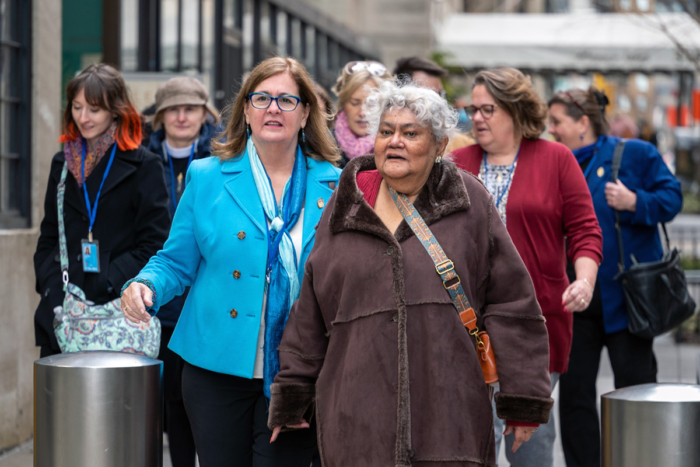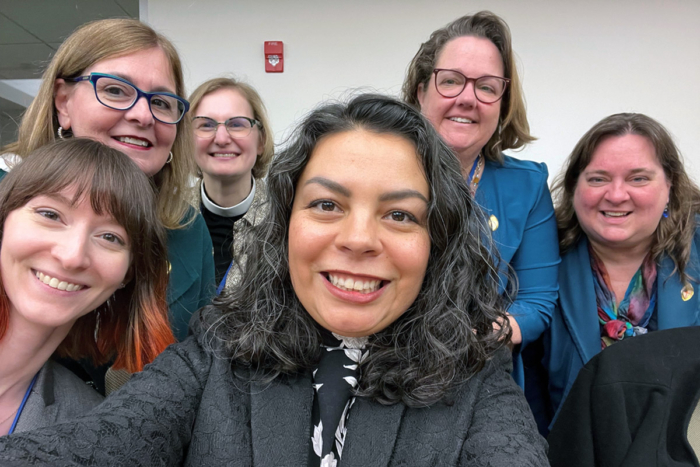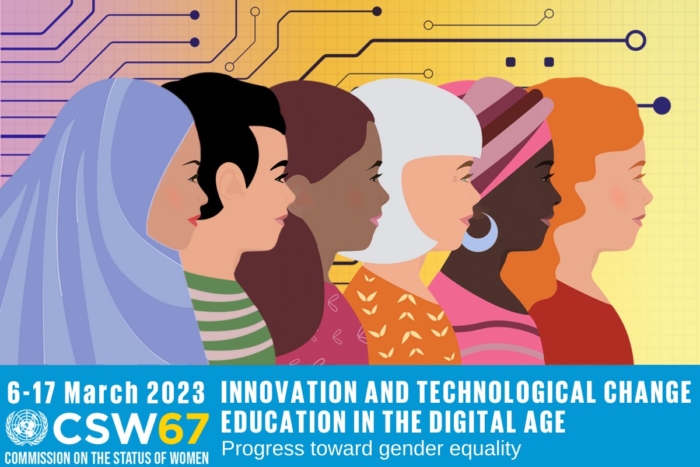Episcopal delegates to UN women’s commission discuss their experiences advocating for gender justicePosted Mar 24, 2023 |
|
[Episcopal News Service] Nine Episcopal women who served as delegates to the 67th United Nations Commission on the Status of Women gathered in a March 23 webinar to discuss the important topics they tackled and the experiences they had during the meeting, which took place March 6-17. The theme for the annual U.N. event was innovation and technological change, and education in the digital age for achieving gender equality and the empowerment of all women and girls.
The nine attended on behalf of Presiding Bishop Michael Curry and represented his identified priorities in their work:
- Extend accessibility to all and prioritize marginalized women and girls.
- Ensure human rights protections, safety and security.
- Accelerate gender equality education for all.
The presiding bishop’s delegation was among more than 7,000 accredited representatives who attended the event, according to Lynnaia Main, The Episcopal Church’s representative to the United Nations
She called this Episcopal delegation the most cohesive in years, in part because they could gather in person for the first time since 2019, but also because they were so dedicated to connecting with each other. “Our fellow ecumenical partners remarked on their diligence and faithfulness,” she said during the webinar, adding, “they have made their mark.”
One delegate who couldn’t be in New York participated online, the first time for a fully hybrid delegation.

Members of the presiding bishop’s delegation walk to the United Nation on March 6 for the opening day of its 67th Commission on the Status of Women. Photo: © David M Rider, used with permission
During each UNCSW, U.N. member states adopt an “agreed conclusions” document, and Main said the work of this year’s presiding bishop delegates had an impact in its development. “We were pleased to see several of our priorities reflected in the agreed conclusions, especially around extending digital access in ways that protect the safety, security and human rights of all.”
Several delegates said that one of the most disturbing issues they discussed was gender-based violence, with the Rev. Lilo Carr Rivera of the Diocese of Long Island noting that the term was used so often it was referred to by the initials GBV, “which was sort of horrifying, quite frankly.” The Rev. Luz Maria Lambis Garces of the Diocese of Colombia added that violence often happens to women and girls online as well as in person, and that shouldn’t be overlooked.
A common thread for many delegates was learning more about the prevailing nature of gender inequality around the world. Yvonne Lodico of the Diocese of Vermont noted that inequality exists not just in developing countries but also in developed nations like the United States. Men and boys need to step up and play a role in changing that, too, Ailysh Cooper of the Diocese of Chicago added.
Delegates also could participate in hundreds of events offered by U.N. member states and by non-governmental organizations. For Mary Ellen Arthurs from the Diocese of Virginia, this included the opportunity to hear from two women in Afghanistan via Zoom who described “the atrocities they faced every single day,” Arthurs said, as well as fearing for their lives every time they heard a knock on their door, knowing it could mean “the end of their education or even worse, the end of their lives.”

House of Deputies President Julia Ayala Harris (center) takes a selfie after meeting with members of the presiding bishop’s delegation to the UNCSW on March 14. With her are (from left) Ailysh Cooper, Ellen Lindeen, the Rev. Lilo Carr Rivera, Mary Ellen Arthurs and Lynnaia Main, who is The Episcopal Church’s representative to the United Nations.
On March 14, delegates met with Julia Ayala Harris, the president of the House of Deputies, who in 2015 was a presiding bishop delegate to the UNCSW and in 2016 was a representative of The Episcopal Church to the Anglican Communion delegation.
Delegates also described the daily morning worship in the Church Center of the U.N. provided by Ecumenical Women at the U.N. as a highlight, as well as being in the General Assembly Hall on March 8 for the observance of International Women’s Day.
Assisting the delegation during their service were members of the presiding bishop’s staff, including representatives from The Episcopal Church offices of Global Partnerships and Government Relations, as well as staff of Episcopal Relief & Development. Former delegates also provided support.
Main also noted that while The Episcopal Church had nine official delegates participating at UNCSW, many other Episcopalians were present during the event as observers, staff to the U.N. or in participating NGOs, including Chiseche Mibenge, who is director for gender initiatives at Episcopal Relief & Development.
The delegates will gather again online in three months, Main said, to learn more about how they are sharing their experiences with others and continuing to advocate for the presiding bishop’s priorities.
– Melodie Woerman is a freelance writer and the former director of communications for the Episcopal Diocese of Kansas.


Social Menu